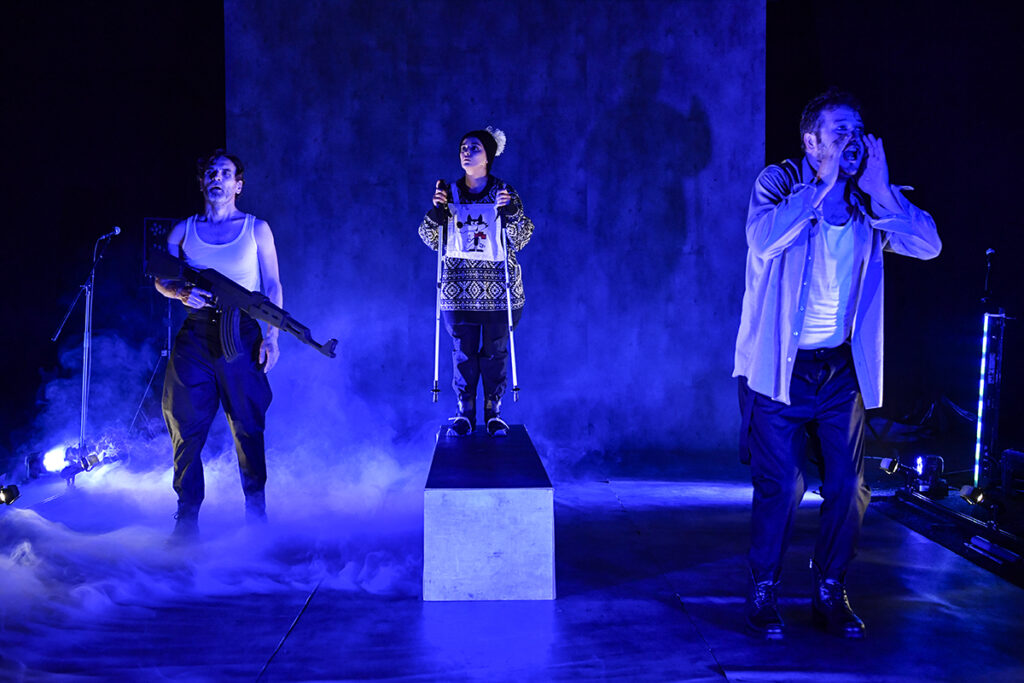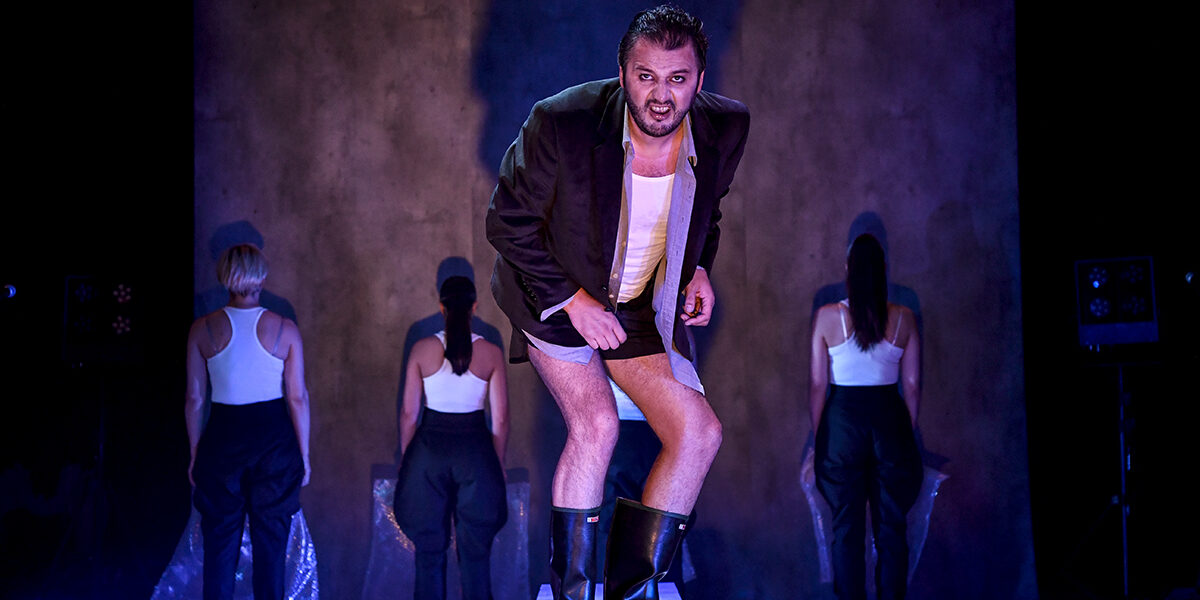Teatri Oda, Prishtina, premiere 3rd June
A grey rectangular object stands in the middle of the minimalist stage. At first, maybe, it appears to be a bench, then a diving board, but eventually the audience come to see it as a grave. The question this play raises is, once you have acquired so much context about what this structure actually is – and what it represents – why would you then deny its essence?
The actors begin The Handke Project by asking the people in the audience to leave the room if they identify themselves as “a fascist, a homophobe or anti-Roma”. They pose questions which ask the audience members to evaluate every kind of prejudiced belief they might hold.
The play is named for the Austrian author Peter Handke, who was awarded the Nobel Prize for Literature in 2019, thus causing much controversy due to his vocal support of Slobodan Milošević and Serbia during the 1990s Yugoslav wars.
Handke not only took the side of the Serbian war criminal Milošević, but he also attended his trial in the Hague and, later at his funeral, Handke delivered a eulogy in which he described himself as close to Milošević and Serbia. In 1997 he also published a pro-Serb book about the Balkan wars entitled ‘A Journey to the Rivers: Justice for Serbia’.
Most of the audience members would have known why Handke caused a stir when he received the Nobel Prize, but Jeton Neziraj has assembled, in a comprehensive way, an account of Handke’s role in genocide denial using words that Handke said or wrote himself. He accused Bosnian Muslims of staging the Srebrenica massacre and compared Serbia’s fate to that of the Jews. His words are spoken – in English – by the actors, Arben Bajraktaraj, Ejla Bavćić , Adrian Morina, Klaus Martini, Verona Koxha, and Anja Drljević – who between them come from Kosovo, Montenegro, Bosnia and Italy – in a coordinated way.
In this way, Handke is disrobed. He is the person who we believe the least on the stage. His defence of literature, of the imagination, of being a great artist above such concerns, becomes hollow. One can write thousands of pages on how to be a good father, but if you’re not one to your own children, your theory is going to waste.
Handke is central to the play, but he is evoked through fictive scenes and comic dialogues in which three actors play Handke in different moments, while information about Handke is revealed to us by an omniscient narrator.
Directed by Blerta Neziraj, the play depicts Handke in a variety of rich and powerful ways. At first, the young Handke takes literature lessons from an ominous older figure. He teaches him to question everything. To use his ‘question mark’ as a tool. Adrian Morina switches between playing Handke and the role of a narrator, informing us about Handke’s sayings and writings in regard to Serbia. Later Ejla Bavćić plays Handke as an isolated figure in the woods as he hunts for deer and cooks mushroom while waiting for a call from the Nobel Prize committee. This scene seems to have been inspired by Handke’s work Essay on the Mushroom Hunter.

The Handke Project. Photos: Atdhe Mulla
The play is not told in a linear way and although it is ostensibly about Handke, at a moment of rising nationalism in the world, Neziraj also explores this major issue in his play.
One of the actresses, Anja Drljević, keeps halting the play to declare “I love theater, but I love Serbia too.” She explains that she is Serbian and so can’t agree to play a part in a controversial play like this because of “the sensitivity of the topic”.
This happens several times. The statement is continuously repeated, interrupting the flow of the scenes and showing how nationalism has spread its roots into artistic spaces, often deforming or entirely obliterating the truth itself.
Politicizing an artistic medium to a degree when actors have to take the sides of nations and censor their free speech so they cannot speak the truth is another theme which this drama addresses.
A later scene concerns the real sex scandal that engulfed the Nobel Prize in 2018 and led to its postponement until 2019. A French photographer, Jean-Claude Arnault, who was married to a former member of the centuries-old Swedish Academy was charged with rape. This is represented in the form of an orgy, in which two female performers caress each other in a sexual way. But this did not contribute to the piece. It actually confused the issue and distracted the viewer, trivializing the events of the scandal, and undermining our emotional engagement with the play.
Much more effective, amid this cruel narrative, was an apparently placid scene in which a Bosnian boy is skiing in the mountains, minding his own business, oblivious to the war below. But this peaceful moment is disrupted when we later learn that his Bosnian father was ordered to call him down from the mountains by Serb soldiers, with a promise that they won’t hurt any of them. In fact, it is revealed that both father and son were found dead.
The play’s position is clear as a tear. It makes Handke’s convictions seem worthless in the face of human suffering but also rationalizes the truth in a very empathic way. One thing is certain, the author cannot be entirely dead, as Barthes claimed; no matter how good he is, he won’t outweigh his humanity. Handke might have gotten accolades from the Nobel Prize Committee, but his name is now synonymous with genocide denial
Credits:
Author: Jeton Neziraj
Director: Blerta Neziraj
Set design Marija Kalabic
Composer Gabriele Marangoni
Choreographer: Gjergj Prevazi
Costume Designer Blagoj Micevski
Lighting design Yann Perregaux
Sound Design Leonardo Rubboli, Tempo Reale
Assistant director Sovran Nrecaj
Production Manager Aurela Kadriu
Production Assistant Flaka Rrustemi
Cast: Arben Bajraktaraj, Ejla Bavćić , Adrian Morina, Klaus Martini, Verona Koxha, and Anja Drljević
Qendra Multimedia in association with Mittelfest and Teatro della Pergola (Italy), Theater Dortmund (Germany), National Theater Sarajevo and International Theater Festival – Scene MESS (Bosnia and Herzegovina)
For tickets and further information, visit: Qendra.org
Further reading: “Peter Handke is the product of the time in which we live.”
Interview: Blerta Neziraj: “As a female director in Kosovo you have to fight constantly.
Florida is a lover of words, and of art in all its forms: fiction, poetry and drama.








